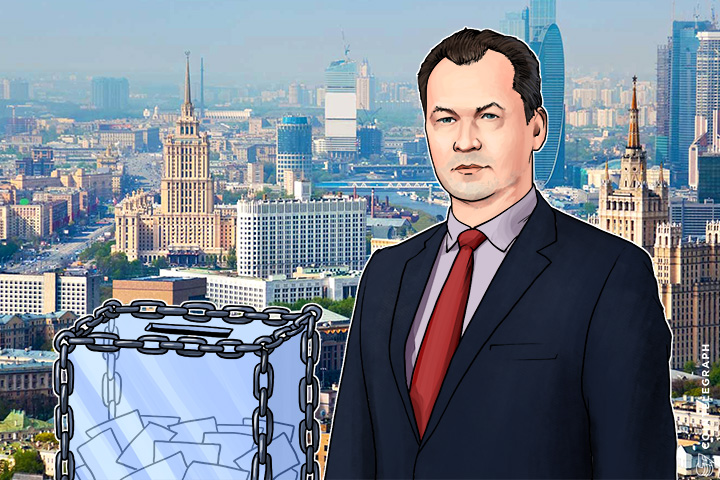National Settlement Depository, Russia’s central securities depository, has successfully tested an e-proxy voting system based on a distributed ledger (blockchain) technology.
It has been eight years since the mysterious Satoshi Nakamoto introduced the definition of blockchain and implemented it in the original source code for his peer-to-peer digital cash system.
While it is still unclear whether or not Bitcoin or other cryptocurrencies have any real long-term value, many argue that the acceptance and wider adoption of blockchain technology are fast approaching.
Various industries see the emergence of some real-world use cases for blockchains.
In Russia, however, examples of practical application of blockchain technology are still limited despite some active discussions.
Moscow blockchain technology forum
Earlier this month Moscow Forum “Blockchain and open platforms - 2016” gathered over 30 speakers, experts in the area of financial technologies, and more than 320 visitors, including representatives from Visa, Microsoft, IBM, major Russian banks and financial institutions.
Opening the Forum, and the first panel discussion covering the latest developments and applications of blockchain technologies, Olga Skorobogatova, the VC of the Bank of Russia, noted that the distributed ledger technology has been studied by the Bank and represents great potential for the Russian financial market. She also mentioned that establishment of the partnership similar to R3 would allow Russian financial institutions to work around the technology more efficiently and with lower costs.
Taking maximum of blockchain technology
Several examples of the application of blockchain technology were demonstrated at the Forum.
The major Russian Bank, Sberbank Rossii, launched a pilot project in December 2015, which implied testing the potential of Ethereum’s blockchain in issuance of power of attorney, its revision, evaluation and the processing of invoices.
Ekaterina Frolovicheva, Chief Executive of the Center for Technological Innovation of Sberbank, says:
“We will be able to draw conclusions about the long-term potential of the project in about a year.”
While working on this project, several other possible options for the application of blockchain were identified, which need more studying.
The National Settlement Depository (NSD) which offers a wide range of services, from clearance and custody service, ex-pit transactions registering (repository), informational services, to collateral management, has also been working on a pilot project in cooperation with DSX Technologies. They have announced that they have successfully finished developing and testing an e-proxy voting system running on a distributed ledger (blockchain technology). The prototype is based on the NXT distributed cryptographic platform and uses ISO 20022 international standard for messaging. The project’s open source code can be found on GitHub.
As Artyom Duvanov, Chief Architect at NDS, says:
“We have finalised development and successfully tested blockchain-based E-proxy voting electronic voting system prototype. However, it is still too early to talk about its application in practice, even though it is totally operationable. Implementation of E-proxy voting would require certain changes in legislation.”
What is E-proxy voting?
E-proxy voting is an innovative technology for corporate actions processing that provides for electronic interaction between securities holders and issuers for the purpose of exchanging information and documents. The system was first implemented at the NSD in August 2014. In April 2015, NSD significantly improved the technology bringing it into compliance with ISO standards. In April 2016, an e-proxy voting system prototype was tested for bondholder meetings.
Eddie Astanin, Chairman of the Executive Board at NSD, says:
"Over the past 10 years, the global financial infrastructure has faced the challenges which make us review the approaches to reliability, security and performance of information systems. It is obvious for us that ignoring the rapid development of FinTech and upgrading the outdated platforms could hinder the stable development of the Russian financial system. Fortunately, Russian specialists are among the most experienced in the global FinTech industry, and we have proven this fact by implementing a fully functional prototype of an e-proxy voting system based on blockchain. After testing blockchain for bondholder meetings, we can extend the use of this technology to other business areas of NSD."

How it works
Existing e-voting technology implies message exchanging via chains of nominal holders from issuer to securities holder and reversely.
The NSD manages the voting ledger by transmitting and counting voting instructions. E-proxy voting’s blockchain-based prototype registers the instructions directly in the distributed ledger, which can be accessed by all chain participants at once. A shareholder votes via their personal account on the nominee's website using their digital signature. After that the nominee registers the securities holder's vote into the blockchain, also accompanying it by a digital signature. In order to confirm that the vote has been received, the nominee provides the securities holder with the identification number that has been assigned to their vote in the distributed database.
Afterwards, the record of the vote is passed on from one nominee to another until it reaches the central securities depository. As the voting is completed, the system calculates the results automatically, and NSD publishes them in the blockchain, using its digital signature. The use of cryptography ensures the integrity of the voting process during every stage.
An E-proxy voting system is expected to increase the number of voting shareholders at the expense of minority shareholders who have not previously taken part in the vote because of the high cost of expenses to do so.
Maria Dolgopolov, Head of Maintenance of Registers and Depository Activities says:
"Shareholders who are not able to participate in the meeting because of the distance, but whose accounts are opened in the registry, will certainly benefit from the system. I think it is more convenient to obtain all the necessary services through its depository (e-proxy voting)”.
NSD will launch e-voting in 2017.


